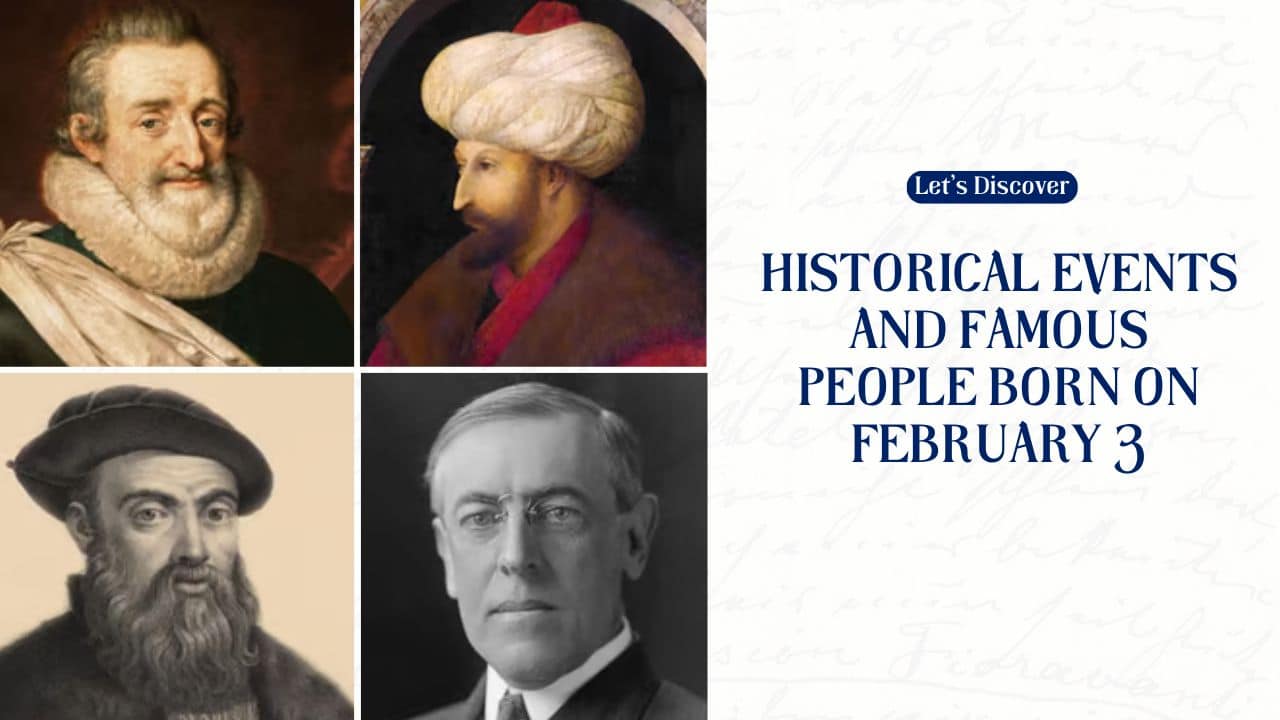February 3 is a date filled with remarkable historical events and notable births that have shaped the world in various ways. Throughout history, this day has witnessed key moments in political, cultural, and military developments that have had lasting effects on societies. From the rise of powerful rulers and major military conflicts to groundbreaking achievements in exploration, literature, and sports, February 3 offers a wealth of historical significance.
Many influential figures, including world leaders, explorers, musicians, athletes, and even infamous criminals, were born on this date. Their contributions have impacted diverse fields such as politics, music, sports, literature, and crime history. This article explores major events that occurred on February 3, highlighting their impact and discussing the lives of some of the most famous individuals born on this day.
Historical Events on February 3
1. Mehmed II Becomes Sultan of the Ottoman Empire (1451)
On February 3, 1451, at the age of 19, Mehmed II ascended to the throne of the Ottoman Empire following the death of his father, Sultan Murad II. Despite his youth, Mehmed II, often referred to as “Mehmed the Conqueror,” demonstrated exceptional leadership and ambition. His most notable achievement was the conquest of Constantinople in 1453, a strategic victory that not only ended the Byzantine Empire but also established the city—renamed Istanbul—as the new capital of the Ottoman Empire. This pivotal event significantly influenced the course of world history, marking the rise of Ottoman dominance in southeastern Europe and the eastern Mediterranean.
2. Henry of Navarre’s Escape from Paris (1576)
In 1576, during the French Wars of Religion—a series of conflicts between Catholics and Huguenots (French Protestants)—Henry of Navarre, a leading Huguenot figure, managed a daring escape from Paris. At that time, Paris was predominantly Catholic and hostile to Protestant leaders. Henry’s escape was a critical turning point, allowing him to continue his leadership of the Huguenot cause. He later converted to Catholicism to ascend the French throne as King Henry IV, famously stating, “Paris is well worth a mass.” His reign brought about the Edict of Nantes in 1598, granting religious tolerance to Huguenots and ushering in a period of relative peace in France.
3. Samuel Clemens Adopts the Pen Name “Mark Twain” (1863)
On February 3, 1863, Samuel Langhorne Clemens first used the pen name “Mark Twain” in a publication for the “Territorial Enterprise,” a newspaper in Virginia City, Nevada. The term “mark twain” is a riverboat measurement indicating a depth of two fathoms (12 feet), signifying safe water for navigation—a nod to Clemens’ early experiences as a riverboat pilot on the Mississippi River. Under this pseudonym, Twain authored several classic American novels, including “The Adventures of Tom Sawyer” and “Adventures of Huckleberry Finn,” works that have become integral to American literature and continue to be studied and cherished for their vivid storytelling and social commentary.
4. The Sinking of USS Housatonic and U.S.-Germany Relations (1917)
On February 3, 1917, the American cargo ship USS Housatonic was sunk by a German U-boat off the coast of Britain. The crew was allowed to abandon ship before it was torpedoed, resulting in no casualties. This incident occurred on the same day that President Woodrow Wilson announced the severance of diplomatic relations with Germany, a response to Germany’s resumption of unrestricted submarine warfare. These actions escalated tensions and contributed to the United States’ decision to enter World War I on the side of the Allies in April 1917, marking a significant shift in the war’s dynamics.
5. The ‘Apex of Moronia’ Incident (1931)
In 1931, renowned journalist and satirist H.L. Mencken referred to the state of Arkansas as the “apex of moronia” in his writings, criticizing what he perceived as the state’s cultural and intellectual shortcomings. In response, the Arkansas legislature humorously passed a resolution to pray for Mencken’s soul, showcasing a rare instance of political figures engaging with criticism through wit rather than confrontation. This incident highlights the tensions between media and politics, as well as the use of satire in public discourse.
Famous People Born on February 3
1. Ferdinand Magellan (1480–1521), Portuguese Explorer
Ferdinand Magellan, born on February 3, 1480, in the region of Trás-os-Montes e Alto Douro, Portugal, was a pioneering navigator whose expedition became the first to circumnavigate the globe. Although Magellan himself did not complete the journey—having been killed in the Philippines in 1521—his fleet, under the command of Juan Sebastián Elcano, successfully returned to Spain in 1522. This monumental voyage provided concrete evidence of the Earth’s roundness and significantly enhanced European understanding of global geography.
| Detail | Information |
|---|---|
| Full Name | Ferdinand Magellan |
| Birth Date | February 3, 1480 |
| Birth Place | Trás-os-Montes e Alto Douro, Portugal |
| Known For | Leading the first circumnavigation of the Earth |
| Died | April 27, 1521, Mactan, Philippines |
2. Felix Mendelssohn (1809–1847), German Composer and Pianist
Jakob Ludwig Felix Mendelssohn Bartholdy, born on February 3, 1809, in Hamburg, Germany, was a prolific composer, pianist, and conductor of the early Romantic period. A child prodigy, Mendelssohn composed symphonies, concertos, and chamber music that remain central to the classical repertoire. Notable works include the “Italian Symphony,” the “Hebrides Overture,” and the “Wedding March” from his incidental music to Shakespeare’s “A Midsummer Night’s Dream.” His music is celebrated for its lyrical beauty and structural clarity.
| Detail | Information |
|---|---|
| Full Name | Jakob Ludwig Felix Mendelssohn Bartholdy |
| Birth Date | February 3, 1809 |
| Birth Place | Hamburg, Germany |
| Known For | Composing symphonies, concertos, and chamber music |
| Died | November 4, 1847, Leipzig, Germany |
3. Robert Gascoyne-Cecil (1830–1903), British Prime Minister
Robert Gascoyne-Cecil, the 3rd Marquess of Salisbury, was born on February 3, 1830, in Hatfield, England. He served as Britain’s Prime Minister three times between 1885 and 1902, making him one of the longest-serving prime ministers in British history. As a Conservative leader, he played a crucial role in shaping British foreign policy, strengthening the British Empire, and maintaining peace in Europe through strategic diplomacy. His tenure saw Britain at the height of its imperial power.
| Detail | Information |
|---|---|
| Full Name | Robert Arthur Talbot Gascoyne-Cecil |
| Title | 3rd Marquess of Salisbury |
| Birth Date | February 3, 1830 |
| Birth Place | Hatfield, England |
| Known For | Serving as British Prime Minister |
| Died | August 22, 1903, Hatfield, England |
4. Bob Woolmer (1948–2007)—English Cricketer and Coach
Bob Woolmer was born on February 3, 1948, in Kanpur, India. He was an all-rounder in English cricket and played in 19 Test matches. After retiring as a player, Woolmer became a successful cricket coach, leading teams like South Africa and Pakistan. His analytical approach and emphasis on technology in coaching transformed modern cricket training. His sudden death during the 2007 Cricket World Cup remains a topic of speculation and mystery.
| Detail | Information |
| Full Name | Robert Andrew Woolmer |
| Birth Date | February 3, 1948 |
| Birth Place | Kanpur, India |
| Known For | English cricketer and international cricket coach |
| Died | March 18, 2007, Kingston, Jamaica |
5. Pretty Boy Floyd (1904–1934)—American Gangster
Charles Arthur “Pretty Boy” Floyd, born on February 3, 1904 in Adairsville, Georgia, was one of America’s most notorious gangsters during the Great Depression. He gained fame for robbing banks and being on the FBI’s Most Wanted list. Though some saw him as a ruthless criminal, others viewed him as a Robin Hood figure who helped struggling farmers by destroying mortgage records during his robberies. Floyd was killed by law enforcement officers in 1934.
| Detail | Information |
| Full Name | Charles Arthur Floyd |
| Birth Date | February 3, 1904 |
| Birth Place | Adairsville, Georgia USA |
| Known For | Bank robberies, organized crime |
| Died | October 22, 1934, East Liverpool, Ohio |
Takeaways
February 3 marks many crucial historical events and the births of individuals who shaped history in diverse ways. From the rise of an Ottoman sultan to a groundbreaking circumnavigation of the Earth, from political leadership in Britain to shaping modern cricket, and even to notorious gangsters, this date holds significant historical weight. Understanding these events and figures helps us appreciate their lasting influence on society.
References
- Encyclopaedia Britannica – Mehmed II: https://www.britannica.com/biography/Mehmed-II
- History.com: Henry IV of France: https://www.history.com/topics/france/henry-iv
- Mark Twain Project, University of California: https://www.marktwainproject.org/
- National World War I Museum, USS Housatonic Sinking: https://www.theworldwar.org/
- The Guardian: Bob Woolmer’s Coaching Legacy: https://www.theguardian.com/sport/
- FBI Records: Pretty Boy Floyd: https://vault.fbi.gov/pretty-boy-floyd







































